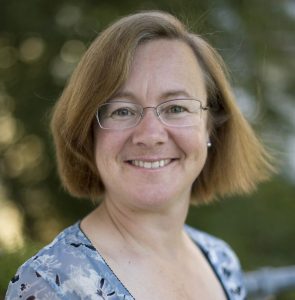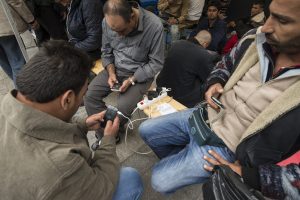 By Dr Tanja Müller, Senior Lecturer in Global Development; Co-Director, Humanitarian and Conflict Response Institute
By Dr Tanja Müller, Senior Lecturer in Global Development; Co-Director, Humanitarian and Conflict Response Institute
One part of the new urban agenda that Habitat III aspires to includes support of refugees for a just city that ends social exclusion. That, like many of these international aspirations usually proclaimed by UN conferences and the like, sounds a rather lofty ambition. Who would really object to a just city where social exclusion would be a thing of the past? In reality, though, social exclusions exist – and in all likelihood always will – at all levels. But probably nothing puts the quest for a just and inclusive city to the test quite as much as large numbers of new population groups arriving in the city.
This was the case in many cities in Germany during the summer of 2015, when Chancellor Angela Merkel decided spontaneously to open the border for stranded refugees for a brief period in time. One of the cities at the centre of what subsequently has been described as a state of great chaos was Berlin. I happen to live just down the road from what was the main refugee reception centre, the so-called LaGeSo.
The LaGeSo was in the news for weeks on end as the place at the centre of Berlin’s Humanitarian Crisis due to its inability to cope with the large amount of refugees who simply awaited registration – the very first step in a long process towards eventually becoming residents of the city.
Refugees camped in the parks and streets outside the LaGeSo often for weeks. The young and the old, the sick and the healthy. All simply to obtain a waiting number that with some luck would ensure a proper appointment, registration, and transferral to proper accommodation eventually.
But while official authorities seemed overwhelmed – the verdict is still out as to whether this was really the case, or whether there was a deliberate policy of making refugees as unwelcome as possible to entice them to reconsider their decision to have come to Germany in the first place.
Citizens of Berlin at large, and of Moabit in particular, the part of town where the LaGeSo was located, stepped in. People who often had never engaged with ‘politics’ or civil engagement of any kind suddenly appeared in front of the LaGeSo. They brought food and medicine, they started German lessons, and many who had a spare room at home simply took some of the refugees with them.
There were also those who tried to boycott or resist this practical attempt to show solidarity, but by and large – and without any political incentive – people responded as people, as fellow human beings, to the crisis on their doorstep.
Many stories have since been told on how taking in refugees has challenged and often changed people’s lives. One of the initiatives based in Berlin that subsequently facilitated matching refugees with hosts, the group Refugees Welcome, soon received requests from other citizens in cities around the world – resulting for example in people as far away as Island to offer their homes and lives to share with refugees and appealing to their government to let more of them in.
But that is only one side of a complex story. The side that may give us hope that solidarity can be created by recognising the stranger, not as the other, but as connected to our own lives through a common band of humanity. A year later, important questions remain. Particularly about how welcome refugees really are once they behave in ways that do not comply with the image of the grateful recipient of benevolence – for example, since the so-called ‘sexmob’ attacks at New Year’s Eve.
Some of those who last year camped in front of the LaGeSo have found work and a place to live. Others were so frustrated by their un-welcome into Germany that they returned to their country of origin. Some with monetary incentives, others just by themselves.
A new refugee reception centre opened and proceedings are allegedly more efficient and smooth – but that may largely be due to the comparatively low number of new arrivals these days. This is partly a result of the deal Angela Merkel has since struck with Turkey. A deal that is envisaged to eventually extend to a number of countries in North Africa.
But more than 40,000 refugees who arrived last summer are estimated to still live in emergency accommodation. Such accommodation might in theory be quite nice and fit for purpose, but often it is not. Around the corner from the former LaGeSo is a stark reminder that often the latter is the case: A refugee accommodation camp built in form of an air-inflated tent, where entry is through a compressed air lock that allows neither fresh air in nor daylight of any kind. It houses mainly Syrian and other Middle Eastern men and families. It offers no real privacy – a particular problem for women who come from a culture where spaces for men and women are often distinct in everyday live and a prerequisite for a sense of comfort and safety.
Recently, one of its inhabitants, an Iraqi refugee, was shot dead by German police while trying to kill a fellow camp-inmate with a knife who had allegedly raped his young daughter. While a police investigation is now under way to ascertain what really happened, violence in this type of refugee camp – and sexual violence in particular – has long been recognised as a problem on the rise.
Those dynamics, coupled with the recent rise in Germany of a new political party that has as its main policy the exclusion of foreigners of any kind, but in particular those of Muslim faith, leaves one with lingering doubts about lofty promises at international gathering such as Habitat III: If a city in one of the most wealthy Western nations cannot cope in a more human way with a comparatively low number of refugees – low in particular compared to the cities in the Global South that bear the brunt of refugee arrivals – what realistic hope is there to overcome social exclusion and live up to the promise of a just city that includes all its inhabitants?
One is reminded here of Hannah Arendt’s dictum in relation to refugee movements in the 1930s that the right to have rights relies on being a citizen of a state, thus there is no solid footing of universal rights in concrete political space. Neither in the city nor beyond.



Trackbacks/Pingbacks